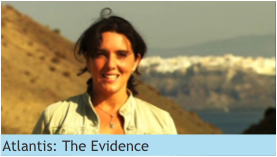Hughes, Bettany (t)
Bettany Hughes (1968- ) is a well-known historian with a high media profile. She has presented one major TV documentary on the subject of Atlantis, specifically supporting aspects of the Minoan Hypothesis. This was Atlantis: The Evidence (Timewatch BBC TWO, 2010)(a) and more recently she has been trotted out to promote a new drama series Atlantis (BBC 2013).
She wrote a preview of this BBC series, for The Telegraph(b), which together with her earlier documentary still raises questions for me about her competence to deal with this subject at all. In her article she refers to the Atlantis story as a moral fable, ignoring the fact that not only were the ‘wicked’ Atlanteans destroyed, but so also were the ‘good’ Athenians.
She then alludes to Plato’s mention of the use of red, black and white stone in Atlantis. It is well known that this combination is common in volcanic regions and has been noted at a number of proposed Atlantis sites; The Canaries, Bolivia, Morocco, Azores, Sardinia and southern Spain.
Next, Hughes tries to explain away the navigation hazard described by Plato, identifying it as pumice. Plato clearly describes mud shoals as the barrier. This would be fine, except that Plato also tells us that the hazard still existed in his day, a thousand years after the eruption. It is improbable, to say the least that pumice would have lingered for a millennium!
These miserable attempts to link Thera and Atlantis are bad enough, Hughes does not explain how Plato repeatedly refers to the Atlantean invasion coming from their base in the the west (Tim.25b & Crit 114c), while Thera/Crete is north of Egypt and south of Athens. Where were the Pillars of Heracles and where were the Minoan elephants?
I would expect a professional like Hughes to offer a more comprehensive review of ALL the information provided by Plato and not dismiss whatever conflicts with her opinion as “sheer fantasy”. This picking and choosing from Plato’s text is not good enough without any justification for her selectivity.
(a) https://www.youtube.com/watch?v=O7bVIq0jNfg
(b) https://www.telegraph.co.uk/culture/tvandradio/10339254/Atlantis-secrets-of-the-real-lost-city.html

